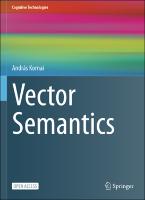Vector Semantics
Abstract
This open access book introduces Vector semantics, which links the formal theory of word vectors to the cognitive theory of linguistics. The computational linguists and deep learning researchers who developed word vectors have relied primarily on the ever-increasing availability of large corpora and of computers with highly parallel GPU and TPU compute engines, and their focus is with endowing computers with natural language capabilities for practical applications such as machine translation or question answering. Cognitive linguists investigate natural language from the perspective of human cognition, the relation between language and thought, and questions about conceptual universals, relying primarily on in-depth investigation of language in use. In spite of the fact that these two schools both have ‘linguistics’ in their name, so far there has been very limited communication between them, as their historical origins, data collection methods, and conceptual apparatuses are quite different. Vector semantics bridges the gap by presenting a formal theory, cast in terms of linear polytopes, that generalizes both word vectors and conceptual structures, by treating each dictionary definition as an equation, and the entire lexicon as a set of equations mutually constraining all meanings.
Keywords
Semantics; Natural Language Processing; Computational Linguistics; Artificial Intelligence; explainable AI; Artificial Neural Nets; lexical semantics; word vectors; embeddings; dynamic embeddings; algebraic semantic; knowledge bases; machine learningDOI
10.1007/978-981-19-5607-2ISBN
9789811956072, 9789811956072Publisher
Springer NaturePublisher website
https://www.springernature.com/gp/products/booksPublication date and place
Singapore, 2023Imprint
SpringerSeries
Cognitive Technologies,Classification
Natural language and machine translation
Computational and corpus linguistics
Artificial intelligence
Machine learning
Expert systems / knowledge-based systems
Literature: history and criticism


 Download
Download Web Shop
Web Shop